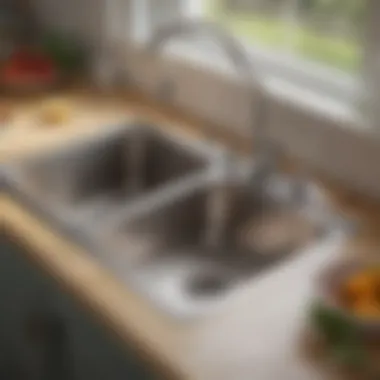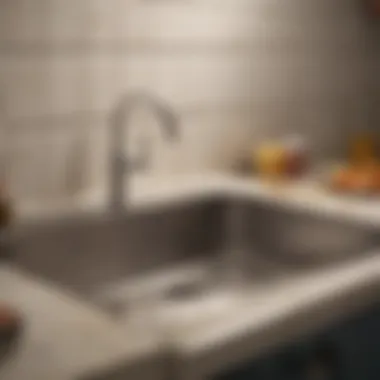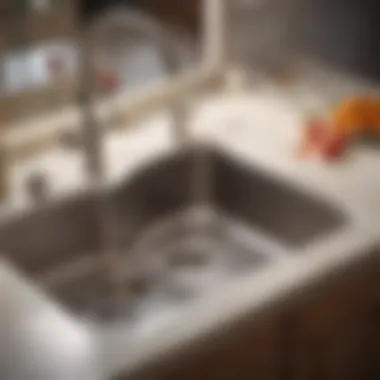Ultimate Guide to Freshening Up Stinky Sinks


Intro
A clean kitchen sink is the heart of a fresh home. However, many find themselves facing that distinct, unpleasant odor wafting from their kitchen sink. It's like a silent ninja that sneaks up on you, catching you unawares. The blend of food residue, grease, and a bit of neglected cleanliness can lead to odorous situations which not only offend the senses but can be a harbinger of bigger problems down the line.
In this guide, we will traverse through the murky waters of sink care, discussing the roots of those nasty smells and presenting you with practical, easy-to-follow cleaning techniques. We’ll cover preventive measures that promise to keep your sink smelling like a breath of fresh air. It doesn't have to be a daunting task - with a bit of know-how and persistence, you can ensure that your kitchen remains an inviting space for family meals and entertaining guests. So let's roll up our sleeves and dive right in!
Understanding the Causes of Sink Odors
Understanding why sinks develop unpleasant odors is key to tackling the issue. Like a detective looking for clues, identifying the root cause can save time and effort in cleaning. Sinks are an integral part of kitchens, and when they smell bad, it not only affects the ambiance but can also hinder cooking and food preparation activities. Knowing the causes is the first step to ensuring a clean and pleasant kitchen space.
Common Sources of Bad Smells
Several culprits can produce those stinky scents wafting from the sink. Oftentimes, food residues play a significant role. Think about it: when we wash plates or cut vegetables, bits and bobs of food can slip away. Even when we think we’ve rinsed them away, they can linger down through the drain or hide in crevices.
Here are some common sources of unpleasant smells:
- Leftover Food Scraps: Food particles can decompose and rot, leading to foul odors.
- Grease Buildup: When fats and oils accumulate, they can become rancid over time.
- Mold and Mildew: Moist environments provide the perfect breeding ground for mold, especially in pipes.
- Standing Water: If water doesn't drain properly, it can become stagnant and stinky.
Understanding these sources can help to create a plan to combat them effectively.
The Role of Trapped Food Particles
Trapped food particles are often like the unwelcome guests that never leave. Even small bits can create a breeding ground for bacteria as they decompose, contributing to that horrid smell.
When food goes down the drain without proper rinsing, it can cling to pipes and build up over time. Over time, that accumulation begins to release gases that create the stink you're so keen to eliminate. To combat this, regular cleaning and maintenance have a critical role.
Tip: Using a fine mesh strainer can effectively catch larger food bits and prevent them from slipping down the drain.
How Plumbing Issues Contribute
Many may never think of plumbing problems as a contributor, but they can be a hidden villain in your kitchen. Issues like broken seals, leaks, or old pipes can create settings for odor development. If the plumbing isn't sealed correctly, waste can escape and produce odors, making it impossible to ignore the problem. Furthermore, a dry trap that doesn't hold water can allow gases from the sewer to seep back into your home.
Consider these plumbing-related issues:
- Dry Trap: Water should always remain in the trap to block odors.
- Debris in Pipes: Over time, sediment or debris can build and block drains, trapping smells.
- Pipe Damage: Cracks in pipes can allow sewer gases to escape, creating a strong odor.
If you notice the scents becoming more intense without an evident source, it may indicate a plumbing issue that requires prompt attention.
By grasping the causes of odor in sinks, including food particles and plumbing problems, you're better situated to take actionable steps to keep your sink fresh.
Assessing Your Sink Situation
Understanding the current state of your sink is crucial in tackling those stubborn odors that seem to linger, like uninvited guests at a dinner party. This step involves more than just giving the basin a quick rinse; it requires a thorough evaluation of both the symptoms of the smell and its underlying causes. Identifying the odor type and conducting a detailed sink check-up can open paths to effective solutions that you might not have thought of before. Evaluating your sink not only saves you time but can also prevent future mishaps, thereby ensuring a pleasant kitchen environment all year round.
Identifying the Odor Type


When a nasty smell wafts up from your sink, it's important to categorize it correctly. Some scents are unmistakable and provide significant clues about the issue at hand. For instance:
- Rotten Eggs: This might indicate the presence of sulfur, often associated with decaying organic matter in your pipes.
- Fishy Smell: Sometimes reminiscent of a seafood market, this could point towards trapped debris or food particles that are in various stages of decomposition.
- Musty Odor: A damp or moldy smell may signify stagnant water or possibly mold growth within your plumbing system.
Each odor type you encounter can guide your next steps in the cleaning process. Identifying what you're dealing with can transform your approach from guesswork to targeted action, making your efforts far more efficient.
Performing a Sink Check-Up
Once the type of odor is identified, performing a sink check-up becomes next on the agenda. This involves looking closely at various components of your sink that can harbor smells. Consider the following:
- Drainage System: Inspect the drain pipes to see if they’re clogged or noticeably dirty, as these can often be the league-leading culprits behind foul odors.
- Garbage Disposal Unit: If your sink has a garbage disposal, check it for leftover food debris or stagnant water. A simple rinse might not cut it; sometimes, a deeper clean is needed.
- Faucet and Sink Basin: Don’t overlook the faucet or the basin itself. Bits of food can accumulate around the edges where they are less visible, forming a breeding ground for unsavory aromas.
A check-up isn't just a one-off task; instead, think of it as a routine exploration. Keeping tabs on these areas ensures that you maintain a fresh-smelling sink long after your cleaning spree has concluded. Investing the time to assess these elements meticulously can save you from larger plumbing disasters down the road.
"An ounce of prevention is worth a pound of cure." - Benjamin Franklin
Whether you're prepping for a big meal or just washing dishes, a fresh sink should be a given in every kitchen. Addressing these nuances now can prevent unwelcome surprises later.
Essential Cleaning Supplies
When it comes to tackling bad smells emerging from a kitchen sink, having the right cleaning supplies on hand is crucial. The right tools and solutions can turn a daunting task into a much more manageable one. This section delves into different cleaning options, enabling you to pick what resonates best for your needs and lifestyle.
Natural Cleaning Solutions
Natural cleaning solutions have been gaining traction among eco-conscious homeowners. These methods are often less harsh on the environment and our health. Plus, many ingredients are staples found in most kitchens, which makes them easy to access. Here are some standout options:
- Baking Soda: Often dubbed the quiet hero of cleaning, baking soda is a powerhouse. When sprinkled down the sink, it can absorb odors and help break down stubborn stains. Combined with vinegar, it creates a bubbling reaction that clears minor clogs while zapping those unwanted smells.
- White Vinegar: This isn't just a salad dressing; it’s a fantastic natural disinfectant too! Pouring vinegar down the drain can help neutralize odors and clear out nasty buildup. Just remember to let it sit for about half an hour for best results.
- Lemon Juice: Freshens up not only the sink but also your mood. The citric acid works wonders on grease and grime, leaving a pleasant scent behind. Simply pour some down the drain or clean the sink directly with a cut lemon.
These natural solutions don't just tackle odors; they provide a gentler cleaning method that aligns with a more sustainable lifestyle. Not to mention, they cost less than commercial cleaners, making them a budget-friendly choice.
Commercial Cleaners to Consider
If you’re looking for a more intense clean or facing particularly stubborn odors, commercially available cleaning products might be your best bet. Here’s a look at some effective options:
- Liquid Plumber: Known for its clog-busting abilities, it can also tackle the odors associated with buildups. However, always use it with care and ensure proper ventilation, as it contains chemicals that can be harsh.
- CLR (Calcium, Lime and Rust Remover): This cleaner is perfect for tackling mineral buildup. If your sink shows any signs of stubborn stains or stubborn smells from limescale, it’s worth trying out.
- Drano: While primarily marketed as a clog remover, many users find it effective in eliminating offensive odors associated with clogs and debris.
When opting for commercial cleaners, one must keep in mind the potential environmental impact and health concerns. Always read labels and follow safety precautions to ensure a safe cleaning experience.
Tools for Effective Cleaning
Having the right tools at your disposal can make a significant difference in the cleaning process. Here’s a rundown of essential tools you should consider:
- Plumber’s Snake: An invaluable tool for reaching deep into the plumbing system. A plumber’s snake can dislodge debris causing odor without having to call in the pros.
- Sponges and Scrub Brushes: Essential for manually scrubbing surfaces. Look for brushes with stiff bristles to help tackle stubborn grime.
- Microfiber Cloths: Perfect for wiping down surfaces and ensuring a streak-free shine. They are absorbent and can catch dust while being soft on hard surfaces.
In summary, having a mix of natural solutions and commercial cleaners on hand, along with the right tools, can greatly enhance your sink cleaning experience, making it more efficient and effective. By equipping yourself appropriately, you're setting the stage for a fresh-smelling kitchen that you'll be proud to show off.


"A clean sink is the heart of a happy kitchen."
Investing in the right cleaning supplies makes this aspiration a reality!
Step-by-Step Cleaning Process
Understanding how to effectively clean your sink isn’t just about masking unpleasant odors; it’s about promoting a wholesome cooking environment. A sink isn’t just a basin for dirty dishes; it's a hub of activity, where food prep and cleanup coexist. A well-maintained sink enhances both the aesthetic and functional aspects of your kitchen. With that in mind, let’s delve into proven strategies for a thorough sink cleaning.
Initial Rinse and Inspection
Before diving into the deep-cleaning techniques, start with an initial rinse. This step might seem trivial, but it sets the tone. Grab your trusty dish spray and spray down the sink. This action helps to loosen any residue and grime present.
- Check for visible issues: As you rinse, keep an eye out for anything that seems amiss. Pay attention to the drain and faucet areas. Do you spot food remnants or stained sections? Get up close—this helps catch any trouble spots that might need extra care.
- Assess the odor: Take a whiff—now's your chance. What does it smell like? If you can pinpoint any rotten or sour notes, it might give you a clue about where to focus efforts. Distinct odors can emerge from trapped debris or even mold. This initial inspection will guide your next steps.
Deep Cleaning Techniques
Now that you’ve done a cursory rinse and inspected your sink, it’s time to get into the nitty-gritty. Using a versatile approach ensures every nook and cranny gets addressed.
- Natural scrubs: A mixture of baking soda and vinegar creates a potent combination. Pour a generous amount of baking soda down the drain, followed by a cup of vinegar. Let the fizzing action work for approximately 15 minutes. This not only clears away minor clogs but also neutralizes smells effectively.
- Commercial cleaners: For persistent stains or odors, certain commercial cleaners can come in handy. Products like Drano or CLR can tackle issues with tough grime or calcium deposits. Always ensure to follow the manufacturer's instructions carefully to avoid damaging your sink.
- Use of scrub brushes: Invest in a good scrub brush designed for kitchen use. The bristles should be firm but gentle enough to avoid scratching. Target areas like the drain cover and faucet, where mineral deposits tend to accumulate.
"A clean sink is a reflection of a clean kitchen, and every bit of effort counts."
Draining the Sink Properly
After working through the cleaning techniques, it’s crucial to ensure your sink drainage system is functioning efficiently. If water stands stagnant, it can lead to unwelcome odors.
- Check your drain for blockages: Once you’ve finished cleaning, run water to verify the drain is clear. If the water drains slowly, there might be a blockage.
- Flush with hot water: Running a stream of hot water down the drain can help wash away any residual debris that may be lingering. This is particularly effective after using baking soda and vinegar as it can help carry away the dislodged grime.
- Final inspection: After draining, perform a final sniff test. Does it smell fresh? If so, congratulations—you've tamed the sink! If odors remain, it might require another deep dive into the cleaning process.
By methodically tackling the issue, you not only restore your sink’s cleanliness but also ensure a more pleasant kitchen experience. Regular maintenance following these steps can prevent odors from surfacing, making each cooking endeavor feel more inviting.
Preventive Measures to Keep Your Sink Fresh
Keeping your sink smelling fresh is not just about the occasional deep clean; it involves regular habits and smart practices that can prevent odors from becoming a problem in the first place. This section dives into how you can maintain a clean-smelling sink, making your kitchen a pleasant place to cook and entertain. By incorporating these preventive measures into your routine, you can save both time and effort while keeping unpleasant smells at bay.
Regular Cleaning Schedule
One of the simplest ways to fend off sink odors is to have a regular cleaning schedule. Just like you dust and vacuum the house, setting aside time for sink care is crucial. You'll want to clean your sink at least once a week to catch any potential messes before they set in. This doesn't have to be elaborate; just a quick scrub with a natural cleaner like white vinegar or baking soda can do wonders.
Moreover, keep in mind that a thorough cleaning isn't enough. To help maintain freshness, wiping down the sink daily and inspecting for buildup can be an absolute game changer. A timer on your phone or a quick note on your calendar can keep you on track. Consistency is key, so stick to that schedule, and soon enough, it’ll turn into a habit.
Using Garbage Disposals Effectively
For those equipped with a garbage disposal, this handy appliance can be a double-edged sword. While it helps in managing food waste, incorrect usage can lead to unpleasant smells. The main rule is simple: treat your garbage disposal well.
- Run water consistently: Always let the water run for a good 30 seconds after you turn off the disposal. This helps flush out any leftover food particles.
- Be mindful of what you dispose of: Avoid fibrous vegetables like celery or starchy foods like rice, which can clog up the system or stick to the blades.
- Freshen it up: Every few weeks, toss in a few ice cubes along with some salt to help grind away grime, and consider squeezing half a lemon down there for a refreshing scent. It’s a small effort that pays off in long-term freshness.


Avoiding Problematic Foods
Lastly, the types of food you rinse down your sink can have a significant impact on whether or not it smells bad. While it might seem convenient to let everything wash down the drain, some foods can wreak havoc.
- Greasy leftovers: These can coat pipes and become a breeding ground for bacteria, leading to odors.
- Coffee grounds: While they may seem harmless, they can accumulate and cause blockages. Instead, consider composting them or tossing them in the trash.
- Eggshells and meat scraps: These can contribute to unwanted smells as they break down.
Remember: Keeping a small kitchen trash bin near your sink and using it for food scraps can help. This is just one more way to keep your sink clean and smelling fresh.
When to Call a Professional
When it comes to keeping your kitchen sink odor-free, some problems are easily solvable by a bit of elbow grease and a few cleaning products. However, some issues are beyond the quick fixes that most people can handle on their own. Recognizing these instances can save both money and headaches in the long run. Knowing when to call in the pros stands as a crucial aspect of maintaining your sink and plumbing system.
Getting professional help means you end up with a thorough, long-lasting solution as opposed to a patch-up job that might only fix the problem temporarily. Therefore, it's essential to understand the signs that indicate a more serious issue and to know when your DIY skills may not suffice.
Signs of Serious Plumbing Issues
Paying attention to the symptoms of plumbing problems can save you a ton of trouble down the line. Here are some key signs to look out for:
- Persistent Odors: If odors persist even after cleaning efforts, it may indicate a deeper issue such as a blockage in the plumbing system.
- Slow Draining Sinks: Water draining slowly can signal clogged pipes or a blocked sewer line. This might not just be an inconvenience; it can also lead to more severe problems.
- Gurgling Noises: If your sink makes strange noises, such as gurgling sounds when drains are used, it points towards air being trapped in the pipes, hinting at potential blockages.
- Water Backups: Experiencing water backing up in your sink is a clear alert that something is amiss in your plumbing and requires immediate attention.
- Frequent Clogs: Constant clogs suggest that there might be a serious blockage further along in your plumbing that your DIY solutions can't reach.
If you notice any of these signs, it might be time to pick up the phone and reach out to a local plumber who can get to the bottom of things.
Understanding When DIY is Not Enough
There are occasions when we feel empowered to tackle plumbing issues ourselves. It can be tempting to think that a simple fix will suffice. But, here are some scenarios when you should step back:
- Complex Pipe Networks: If your sink setup involves more than just a simple drain line, you might be dealing with a more complex plumbing system. Understanding the intricacies of your own sink can be a tall order and could lead to more damage if handled incorrectly.
- Structural Damage: If you suspect damage to pipes, such as leaks resulting from corrosion or cracked pipes, trying to fix it on your own can worsen the problem. Professionals have tools and expertise to handle such structural issues properly.
- Health Hazards: Issues like black mold or sewage backups can pose health risks to you and your family. In such cases, it’s critical to let professionals do what they do best, ensuring everything is safely restored to order.
- Lack of Time or Tools: Not everyone has the luxury of time to commit to exhaustive DIY projects, nor do they always have the necessary tools. Sometimes it pays off to just let someone else handle it faster.
Always prioritize your health and safety!
Knowing when to wave a white flag is not a defeat; it's a conscious decision to maintain your home's integrity. In the long run, it can prove to be a wise investment.
When it comes to ensuring a clean and pleasant space in your kitchen, recognizing when the time is ripe for professional intervention is paramount. By doing so, you create a safe environment and avoid exacerbating potential problems.
End
In the realm of kitchen maintenance, addressing sink odors is not merely a matter of aesthetics; it influences overall kitchen hygiene and cooking efficiency. This article shines a light on the various aspects of cleaning stinky sinks to ensure that every culinary experience is pleasant, from preparing a simple salad to hosting an elaborate dinner party. If a kitchen is a heart of the home, then a clean and fresh sink is crucial to its proper function.
Summarizing Key Points
Through our exploration, we have highlighted essential elements that contribute to maintaining a fresh-smelling sink. Key points include:
- Understanding the sources of unpleasant odors, which can range from trapped food particles to plumbing concerns.
- The importance of using the correct cleaning supplies, both natural and commercial, to tackle these odors effectively.
- A straightforward step-by-step cleaning process that ensures thoroughness in your approach.
- Implementing preventive measures like a regular cleaning schedule and mindful disposal of food waste.
- Recognizing when professional help is needed to avoid exacerbating plumbing issues.
By keeping these points in mind, home cooks can guard against the unpleasant surprises that linger in the sink and enjoy a more inviting kitchen atmosphere.
Emphasizing Ongoing Maintenance
Maintaining that fresh and clean sink requires an ongoing commitment. Just like any other area in the kitchen, sinks need their share of attention. Here's how to maintain your sink's freshness:
- Regular Cleaning: Make it part of your routine to clean the sink after each use to prevent any build-up. A quick scrub with a natural cleaner can work wonders.
- Smart Disposal: Be mindful of what goes down the drain. Avoid putting fibrous or starchy foods through the garbage disposal, as these can lead to clogs and odors.
- Periodic Deep Cleaning: Schedule a more thorough cleaning every couple of weeks. This may involve disassembling the strainer to clean out any hidden debris.
- Monitor for Changes: If any new odors appear, it could signal a plumbing issue that needs immediate attention. Don't wait for it to worsen.
In sum, the upkeep of your sink is a small investment of time that pays off in a clean and fresh kitchen, enhancing both cooking enjoyment and overall home hygiene. Don’t let a stinky sink cramp your culinary style.







